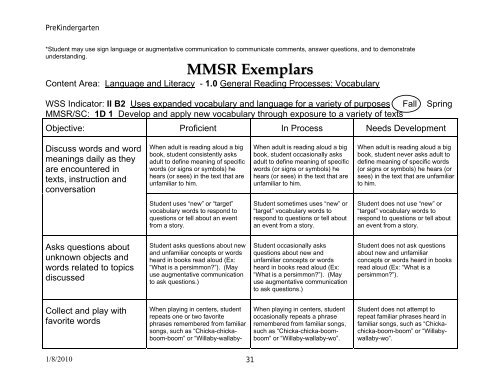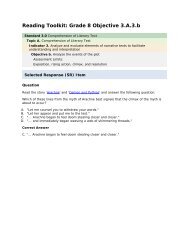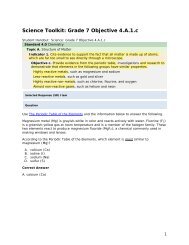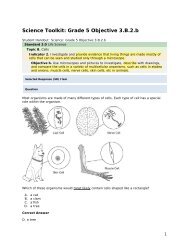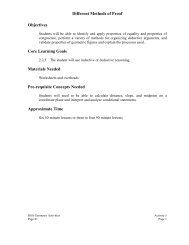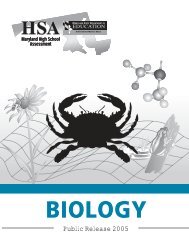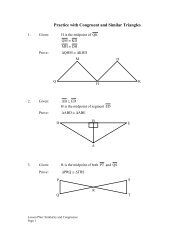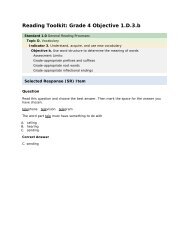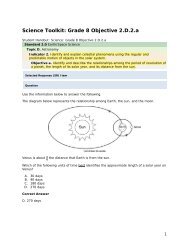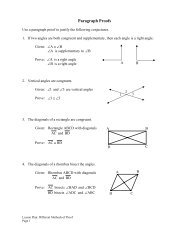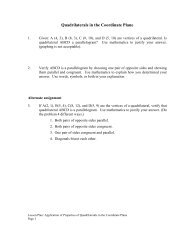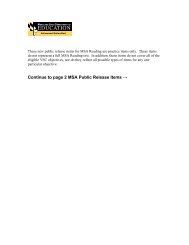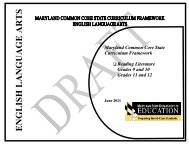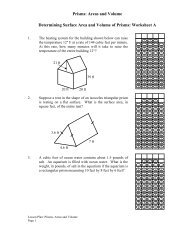Maryland Model for School Readiness (MMSR ... - mdk12
Maryland Model for School Readiness (MMSR ... - mdk12
Maryland Model for School Readiness (MMSR ... - mdk12
Create successful ePaper yourself
Turn your PDF publications into a flip-book with our unique Google optimized e-Paper software.
PreKindergarten<br />
*Student may use sign language or augmentative communication to communicate comments, answer questions, and to demonstrate<br />
understanding.<br />
<strong>MMSR</strong> Exemplars<br />
Content Area: Language and Literacy - 1.0 General Reading Processes: Vocabulary<br />
WSS Indicator: II B2 Uses expanded vocabulary and language <strong>for</strong> a variety of purposes Fall Spring<br />
<strong>MMSR</strong>/SC: 1D 1 Develop and apply new vocabulary through exposure to a variety of texts<br />
Objective: Proficient In Process Needs Development<br />
Discuss words and word<br />
meanings daily as they<br />
are encountered in<br />
texts, instruction and<br />
conversation<br />
When adult is reading aloud a big<br />
book, student consistently asks<br />
adult to define meaning of specific<br />
words (or signs or symbols) he<br />
hears (or sees) in the text that are<br />
unfamiliar to him.<br />
When adult is reading aloud a big<br />
book, student occasionally asks<br />
adult to define meaning of specific<br />
words (or signs or symbols) he<br />
hears (or sees) in the text that are<br />
unfamiliar to him.<br />
When adult is reading aloud a big<br />
book, student never asks adult to<br />
define meaning of specific words<br />
(or signs or symbols) he hears (or<br />
sees) in the text that are unfamiliar<br />
to him.<br />
Student uses “new” or “target”<br />
vocabulary words to respond to<br />
questions or tell about an event<br />
from a story.<br />
Student sometimes uses “new” or<br />
“target” vocabulary words to<br />
respond to questions or tell about<br />
an event from a story.<br />
Student does not use “new” or<br />
“target” vocabulary words to<br />
respond to questions or tell about<br />
an event from a story.<br />
Asks questions about<br />
unknown objects and<br />
words related to topics<br />
discussed<br />
Student asks questions about new<br />
and unfamiliar concepts or words<br />
heard in books read aloud (Ex:<br />
“What is a persimmon?”). (May<br />
use augmentative communication<br />
to ask questions.)<br />
Student occasionally asks<br />
questions about new and<br />
unfamiliar concepts or words<br />
heard in books read aloud (Ex:<br />
“What is a persimmon?”). (May<br />
use augmentative communication<br />
to ask questions.)<br />
Student does not ask questions<br />
about new and unfamiliar<br />
concepts or words heard in books<br />
read aloud (Ex: “What is a<br />
persimmon?”).<br />
Collect and play with<br />
favorite words<br />
When playing in centers, student<br />
repeats one or two favorite<br />
phrases remembered from familiar<br />
songs, such as “Chicka-chickaboom-boom”<br />
or “Willaby-wallaby-<br />
When playing in centers, student<br />
occasionally repeats a phrase<br />
remembered from familiar songs,<br />
such as “Chicka-chicka-boomboom”<br />
or “Willaby-wallaby-wo”.<br />
Student does not attempt to<br />
repeat familiar phrases heard in<br />
familiar songs, such as “Chickachicka-boom-boom”<br />
or “Willabywallaby-wo”.<br />
1/8/2010 31


